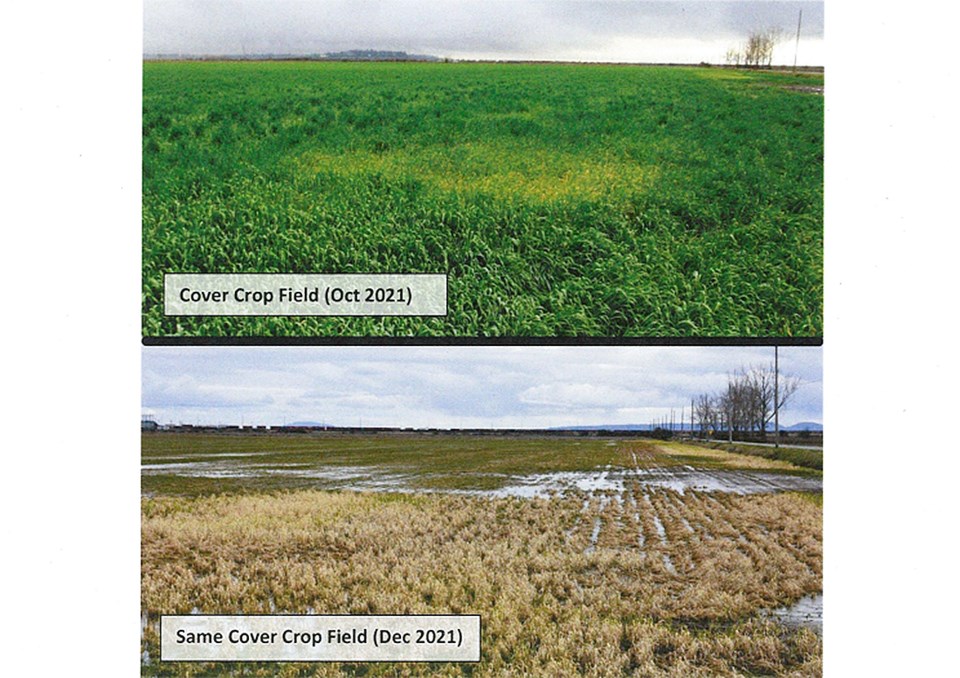Metro Vancouver is exploring how to improve ecosystem services in the region, and a Delta-based organization could be an ideal model.
Ecosystem services are natural assets that benefit people and wildlife, according to Metro, which notes such services include, among other things, wildlife habitat, carbon sequestration, water infiltration and flood management.
A Metro report entitled Climate 2050 Roadmap Draft: Agriculture, released last year, noted farms must become as healthy and resilient as possible, and that can be achieved by understanding and benefiting from the ecosystem services provided by nature and working with those systems to ensure the long-term viability of agricultural producers.
The regional district in October 2021 hired a consultant to undertake a two-phased agricultural ecosystem services benefits study.
The Metro Vancouver board last year had approved funding to begin examining the benefits and potential uses of ecosystem services on agricultural land. A final report with recommendations is to be ready by February 2023.
The preliminary study work was a scoping exercise to increase the understanding of the benefits of ecosystem services within the region and to lay a foundation for supporting, expanding, and ultimately paying for, the use and protection of ecosystem services as a standard practice.
Also expanding upon previous work, the study’s objectives include, among other things, determining how ecosystem services can increase the resilience of local farming operations and contribute to the agricultural sector’s ability to adapt to climate change impacts and maintain crop yields, particularly in terms of flooding, temperature increases, drought, and the appearance of new and invasive pest species.
The objectives also include engaging with stakeholders to better understand the challenges and opportunities associated with such things as conservation agreements and farmer compensation such as payments for ecosystem services provided.
The report notes that while ecosystem services is proving to be beneficial to increasing the resilience of farming operations, it requires setting aside viable private land that can grow food/crops for natural ecosystem functions.
Delta Farmland and Wildlife Trust's programs have been helping wildlife and farmers for decades
It remains to be seen if a unique Delta organization that’s been around for decades, the Delta Farmland and Wildlife Trust (DFWT), will used as a model elsewhere in the region.
Established by local farmers and conservationists to conserve agricultural and wildlife resources within the Fraser River delta, the DFWT promotes the preservation of farmland and associated wildlife habitat through sustainable farming and land stewardship.
The DFWT administers stewardship programs that are made available to Delta farmers. Under these programs, the DFWT shares the cost of management practices contributing to soil and/or wildlife habitat conservation and enhancement.
The DFWT undertakes research, the Grassland Set-aside Stewardship Program, Winter Cover Crop Stewardship Program, Forage Enhancement Program, as well as annual monitoring and evaluation.
The latest report from the DFWT notes funds from the City of Delta, combined with other funding sources, facilitated the planting of approximately 173 hectares (427 acres) of grassland set-asides in Delta, approximately 1,554 hectares (3,839 acres) of winter cover crops, and approximately 234 ha (577 acres) of forage enhancement lands.
MODELS AND HOW TO PAY FOR THEM TO BE CONSIDERED
When it comes to payment and programs for ecosystem services, the Metro Climate 2050 Roadmap Draft: Agriculture report makes note of the DFWT’s ongoing work, saying that in order for the agricultural sector to be resilient in the wake of a significantly changing climate, adaptation will need to take place at the farm level.
“This requires that individual farmers take their land out of production; and although this results in the farmer losing the ability to expand their business, these set-aside areas also provide benefits to the farmer in the form of ecosystem services that provide habitat for pollinators and well as natural flood and erosion control. In order to make establishing set-asides financially viable for the farming community, they need appropriate compensation, directly or indirectly, for these set-asides,” the report notes.
“Delta Farmland and Wildlife Trust and Farmland Advantage provide programs that specifically support ecosystem services in farmland in Metro Vancouver but there are other indirect tools (e.g., land acquisition programs) that can be used to share the burden throughout the entire population of Metro Vancouver as all residents, businesses and visitors benefit from supporting measures that help farmers maintain a sustainable business and that help farms adapt and increase their resiliency,” the report adds.
Also noting other programs and policies have been used in B.C. and Canada to support the expansion of ecosystem services on agricultural land, the report suggests funding sources for the Lower Mainland would need to be examined and reviewed to determine the most appropriate and effective option for supporting ecosystem services within the region’s agricultural areas.



